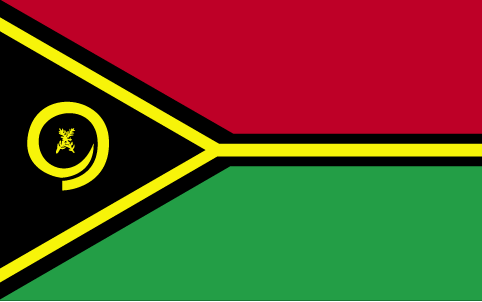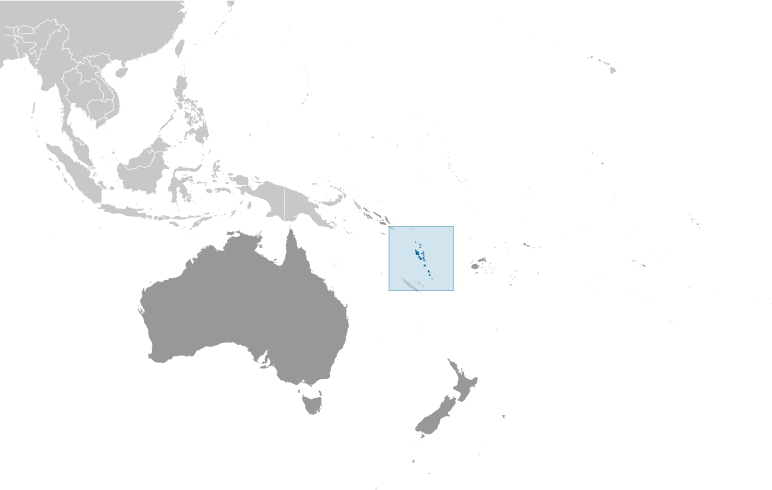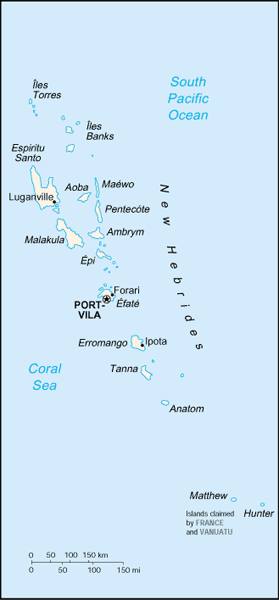Multiple waves of colonizers, each speaking a distinct language, migrated to the New Hebrides in the millennia preceding European exploration in the 18th century. This settlement pattern accounts for the complex linguistic diversity found on the archipelago to this day. The British and French, who settled the New Hebrides in the 19th century, agreed in 1906 to an Anglo-French Condominium, which administered the islands until independence in 1980, when the new name of Vanuatu was adopted.
Population
221,552 (July 2010 est.)
Country comparison to the world:184
Nationality
Noun:Ni-Vanuatu (singular and plural)
Adjective:Ni-Vanuatu
Ethnic groups
Ni-Vanuatu 98.5%, other 1.5% (1999 Census)
Religions
Presbyterian 31.4%, Anglican 13.4%, Roman Catholic 13.1%, Seventh-Day Adventist 10.8%, other Christian 13.8%, indigenous beliefs 5.6% (including Jon Frum cargo cult), other 9.6%, none 1%, unspecified 1.3% (1999 Census)
Languages
local languages (more than 100) 72.6%, pidgin (known as Bislama or Bichelama) 23.1%, English 1.9%, French 1.4%, other 0.3%, unspecified 0.7% (1999 Census)
Country Name
Conventional long form:Republic of Vanuatu
Conventional short form:Vanuatu
Local long form:Ripablik blong Vanuatu
Local short form:Vanuatu
Former:New Hebrides
Government Type
parliamentary republic
Capital
Name:Port-Vila (on Efate)
Geographic coordinates:17 44 S, 168 19 E
Time difference:UTC+11 (16 hours ahead of Washington, DC during Standard Time)
Administrative divisions
6 provinces; Malampa, Penama, Sanma, Shefa, Tafea, Torba
Independence
30 July 1980 (from France and the UK)
National Holiday
Independence Day, 30 July (1980)
Constitution
30 July 1980
Legal system
unified system being created from former dual French and British systems; has not accepted compulsory ICJ jurisdiction
Suffrage
18 years of age; universal
Executive branch
Chief of state: President Iolu Johnson ABBIL (since 3 September 2009)
Head of government:Prime Minister Edward NATAPEI (since 22 September 2008); Deputy Prime Minister Sato KILMAN (since 19 November 2009)
Cabinet:Council of Ministers appointed by the prime minister, responsible to parliament
(For more information visit the World Leaders website)
Elections:president elected for a five-year term by an electoral college consisting of parliament and the presidents of the regional councils; election for president last held on 2 September 2009 (next to be held in 2014); following legislative elections, the leader of the majority party or majority coalition usually elected prime minister by parliament from among its members; election for prime minister last held on 22 September 2008 (next to be held following general elections in 2012)
Election results:Iolu Johnson ABBIL elected president, with 41 votes out of 58, on the third ballot on 2 September 2009
Legislative branch
unicameral Parliament (52 seats; members elected by popular vote to serve four-year terms)
Elections:last held on 2 September 2008 (next to be held in 2012)
Election results:percent of vote by party - NA; seats by party - VP 11, NUP 8, UMP 7, VRP 7, PPP 4, GC 2, MPP 1, NA 1, NAG 1, PAP 1, Shepherds Alliance 1, VFFP 1, VLP 1, VNP 1, VPRFP 1, and independent 4; note - political party associations are fluid
note: the National Council of Chiefs advises on matters of culture and language
Judicial branch
Supreme Court (chief justice is appointed by the president after consultation with the prime minister and the leader of the opposition, three other justices are appointed by the president on the advice of the Judicial Service Commission)
Political Parties and Leaders
Greens Confederation or GC [Moana CARCASSES]; Jon Frum Movement or JF [Song KEASPAI]; Melanesian Progressive Party or MPP [Barak SOPE]; Nagriamel movement or NAG [Havo MOLI]; Namangi Aute or NA [Paul TELUKLUK]; National United Party or NUP [Ham LINI]; People's Action Party or PAP [Peter VUTA]; People's Progressive Party or PPP [Sato KILMAN]; Shepherds Alliance Party [leader NA]; Union of Moderate Parties or UMP [Serge VOHOR]; Vanua'aku Pati (Our Land Party) or VP [Edward NATAPEI]; Vanuatu Family First Party or VFFP [Eta RORI]; Vanuatu Labor Party or VLP [Joshua KALSAKAU]; Vanuatu National Party or VNP [Issac HAMARILIU]; Vanuatu Republican Farmers Party or VPRFP [Jean RAVOU]; Vanuatu Republican Party or VRP [Maxime Carlot KORMAN]
Political pressure groups and leaders
NA
International organization participation
ACCT, ACP, ADB, AOSIS, C, FAO, G-77, IBRD, ICAO, ICRM, IDA, IFC, IFRCS, ILO, IMF, IMO, IMSO, IOC, ITU, ITUC, MIGA, NAM, OAS (observer), OIF, OPCW, PIF, Sparteca, SPC, UN, UNAMID, UNCTAD, UNESCO, UNIDO, UPU, WHO, WMO, WTO (observer)
Diplomatic representation in the US
Vanuatu does not have an embassy in the US; it does, however, have a Permanent Mission to the UN
Diplomatic representation from the US
the US does not have an embassy in Vanuatu; the ambassador to Papua New Guinea is accredited to Vanuatu
Flag description
two equal horizontal bands of red (top) and green with a black isosceles triangle (based on the hoist side) all separated by a black-edged yellow stripe in the shape of a horizontal Y (the two points of the Y face the hoist side and enclose the triangle); centered in the triangle is a boar's tusk encircling two crossed namele fern fronds, all in yellow; red represents the blood of boars and men, green the richness of the islands, and black the ni-Vanuatu people; the yellow Y-shape - which reflects the pattern of the islands in the Pacific Ocean - symbolizes the light of the Gospel spreading through the islands; the boar's tusk is a symbol of prosperity frequently worn as a pendant on the islands; the fern fronds represent peace










